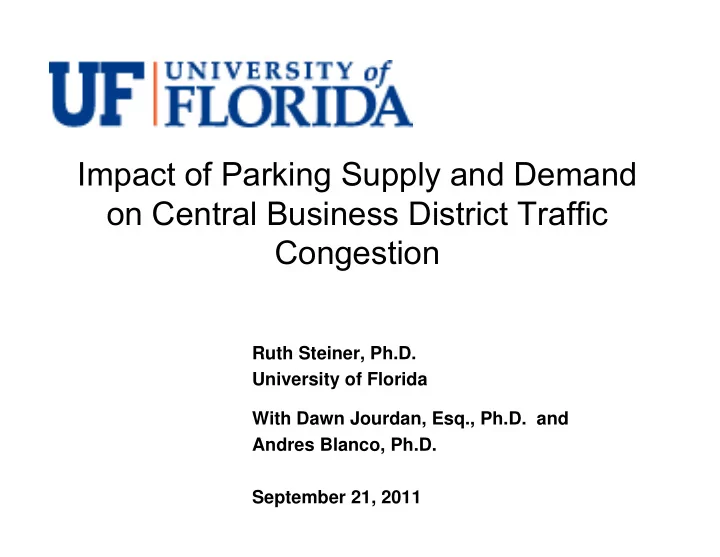

Impact of Parking Supply and Demand on Central Business District Traffic Congestion Ruth Steiner, Ph.D. University of Florida With Dawn Jourdan, Esq., Ph.D. and Andres Blanco, Ph.D. September 21, 2011
Conventional Policy • Widen Roads • Widen Spaces • Add Lanes • Add Spaces • Free • Free • Cannot Build our way • Cannot continue to out of congestion on oversupply parking roads • Parking Management • Transport Demand Management
Why are we doing this? Congestion levels ↑ in the Miami and Fort Lauderdale metropolitan statistical (MSA) area The average peak ‐ period traveler in Miami MSA Aggregation of 146 million hrs of travel delay and 102 experienced an additional 47 hours extra in travel time million gallons of wasted fuel, a monetary cost of $2.95 and consumed an additional 33 gallons of fuel due to billion, up from a cost of $2.05 million in 1982 congestion. (TTI, 2007) FDOT District 4 and 6: To better understand the extent to which congestion management investments in Central Business Districts (CBDs) of Delay Economic Fort Lauderdale Miami Reduction Development Capacity Quality of Life & Utilization Sustainability GHG Travel time Transit Emissions Reliability Performance Parking should be a larger congestion management solution and other community objectives.
Task 1 Task 2 Task 3 Task 4 Task 5 Task 6 Task 7 A Study of the Impact of Parking Supply and Demand Management: Miami and Ft. Lauderdale CBDs
Methodology Field Survey: Parking Supply Pricing/ Rates Data Collection : Interview South Florida Parking inventory Agencies: Miami Parking Authority Miami-Dade County Field Observation City of Miami Work with Practitioners Review: Literature Public Documents Technical Advisory Committee Meetings Peer Cities: Interview Review best practices
Parking Supply/Demand Management An accurate count of public and private parking supply is critical.
Parking Information Systems The availability of information is a key component of making the most of current parking supply. Source: SF.StreetsBLOG.org
Variable Pricing for Hot Spots On-Street Parking The cost of parking should vary by place and time of day to encourage the use of alternative modes of transportation.
Parking and Revenue Streams Informal parking should be upzoned and appropriately taxed. Variable pricing is critical in achieving 85% occupancy. Revenue should be shared with neighborhood associations.
Parking and Transit Performance Commuters are responsive to parking policies. Transit services must be coordinated with parking infrastructure
Parking Credits for Multi-Modal Infrastructure Developers should be relieved from parking requirements if they provide: bicycle parking and lockers transit amenities subsidize transit operation car sharing
Sustainable Land Use and Transportation Planning Regional land use patterns must deemphasize parking requirements and create enough density to support multimodal transportation options.
Lessons Learned Study is an integrated approach to the study of parking. Parking supply and demand are critical issues to the future development of the Central Business District. Coordination of parking supply, transit service, and land use policies are critical components to the production of a more sustainable land use pattern.
Questions? For additional information, contact: Ruth L. Steiner, (352)-392- 0997, ext. 431; rsteiner@dcp.ufl.edu
Recommend
More recommend